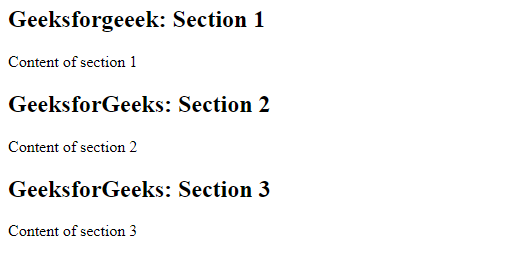HTML <section> Tag
Last Updated :
17 Jan, 2024
The Section tag defines the section of documents such as chapters, headers, footers, or any other sections. The section tag divides the content into sections and subsections.
The section tag is used when requirements of two headers or footers or any other section of documents are needed. Section tag grouped the generic block of related contents. The main advantage of the section tag is, it is a semantic element, that describes its meaning to both the browser and the developer.
Note: Section tag is used to distribute the content i.e., it distributes the sections and subsections.
Syntax:
<section> Section Contents </section>
Example 1: The implementation of the section tag
HTML
<!DOCTYPE html>
<html>
<body>
<section>
<h1>
Geeksforgeeek: Section 1
</h1>
<p>
Content of section 1
</p>
</section>
<section>
<h1>
GeeksforGeeks: Section 2
</h1>
<p>
Content of section 2
</p>
</section>
<section>
<h1>
GeeksforGeeks: Section 3
</h1>
<p>
Content of section 3
</p>
</section>
</body>
</html>
|
Output:

Nested Section tag:
The section tag can be nested. The font size of subsection is smaller than section tag if the text contains the same font property. The subsection tag is used for organizing complex documents. A rule of thumb is that section should logically appear in outline of the document.
Example 2: The implementation of the nested section tag
HTML
<!DOCTYPE html>
<html lang="en">
<head>
<title>Document</title>
<style>
body {
text-align: center;
}
</style>
</head>
<body>
<section>
<h1 style="color: green;">
Geeksforgeeek: Section 1
</h1>
<p>
Content of section 1
</p>
<section>
<h1>Subsection</h1>
<h1>Subsection</h1>
</section>
</section>
<section>
<h1>GeeksforGeeks: Section 2</h1>
<p>Content of section 2</p>
<section>
<h1>Subsection</h1>
<h1>Subsection</h1>
</section>
</section>
</body>
</html>
|
Output:

Supported Browsers:
- Google Chrome 5.0
- Edge 9.0
- Mozilla 4.0
- Safari 5.0
- Opera 11.5
Share your thoughts in the comments
Please Login to comment...